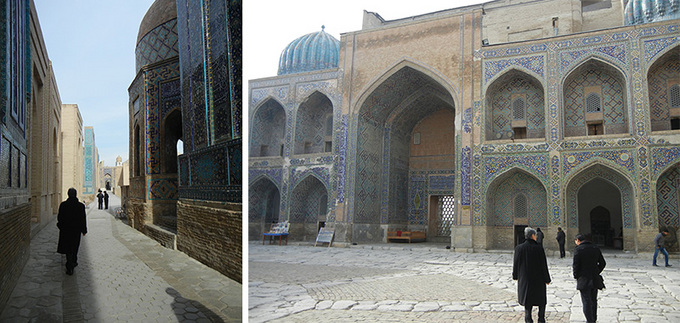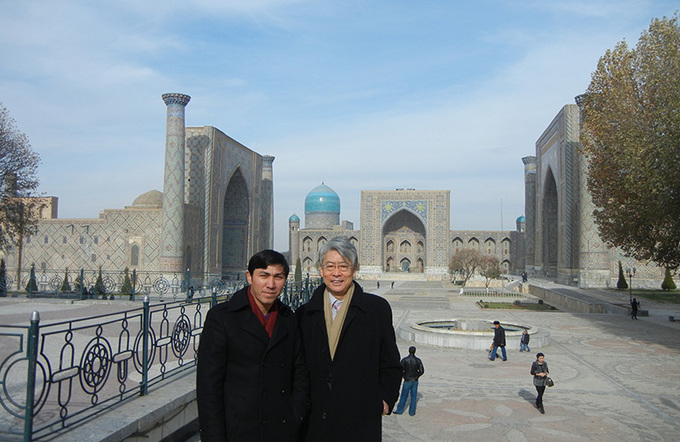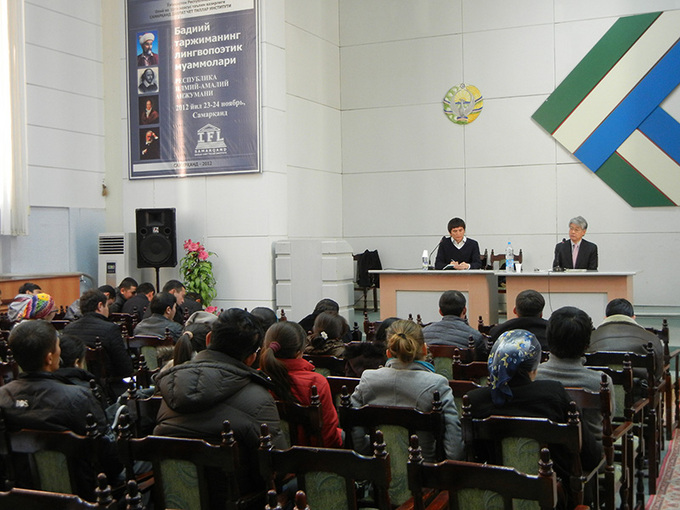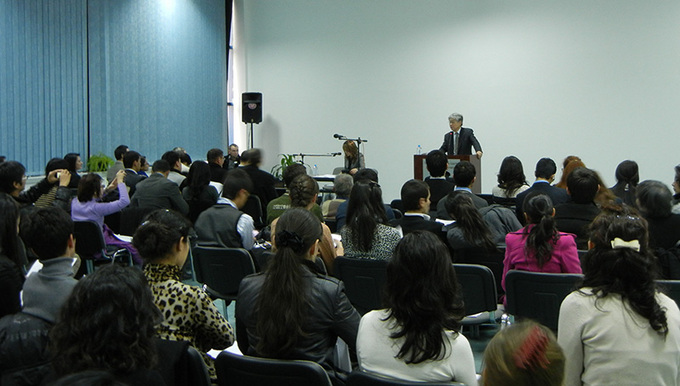Nobuhiko Shima's Lecture in Uzbekistan: On Finding the Determination to Face a National Crisis
Nobuhiko Shima
Journalist and Chairman of the Japan-Uzbekistan Association
It had been a long time since I visited Uzbekistan last time. That was five years ago when I was with a party of 50 members of the Japan-Uzbekistan Association, visiting the country to celebrate the 10th anniversary of the founding of the association. My very first visit to the country was in 1996 as a freelance journalist and now it was my fifth trip. This time, I had been asked by the Japan Foundation to give talks in Uzbekistan on the current social situation in Japan and on the attitudes and lifestyles of Japan's younger generation. It was a tight schedule--a five-day trip of which one night would be spent in flight.
I was happy to accept this invitation to talk to young people of Uzbekistan because it struck me as a good opportunity to explain the changes in the Japanese society, lives and way of thinking, which have been seen after the Great East Japan Earthquake of March 11, 2011. I would be talking to students and other young people at the Samarkand State Institute of Foreign Languages and the Uzbekistan-Japan Center for Human Development in Tashkent. The March 11th earthquake had been the focus of widespread coverage by the global media, and Japan received generous support and words of encouragement from the people of Uzbekistan. I began my lecture by expressing Japan's heartfelt gratitude for the support and concern sent from Uzbekistan and gave a brief description of how the country was recovering from the disaster. The main focus of my talk was on the changes that had taken place in the psychological mindset of the Japanese people as a whole and how they were now determined to take on the challenge of overcoming the "third crisis" in its history.
The first and second national crises to befall Japan
Within the last 200 years, Japan has experienced two perilous upheavals. The first was the Meiji Restoration which signaled the fall of the 250-year rule of the Tokugawa shogunate and when western nations repeatedly tried to persuade Japan to open itself to the West. The Tokugawa government was facing the internal menace of civil war and the threat of colonization by foreign powers, and became losing its ability to administer the country. The crisis was resolved by the energy of young, lower-class samurai and the support of open-minded lords, ordinary folk and rich merchants. Their leaders such as Sakamoto Ryoma and Takasugi Shinsaku met early deaths, unable to see in the new era, but the surge of enthusiasm over the legacy of their convictions led to the rise of modern Japan and saved the country from being annexed by other nations.
The second crisis came with the end of World War II. With Japan's defeat in the war in the Pacific, the General Headquarters of the Supreme Commander for the Allied Powers (GHQ) purged Japan's military leaders, top bureaucrats, journalists and intellectuals, and called for the zaibatsu (financial and industrial conglomerates) to disband. Again, it was the younger generation in their twenties to forties, displaced by the ravages of war, who took on the task of rebuilding the country from scratch. They vowed to forsake war, adopt democratic elections, revise the educational and legal systems and make a new start as a nation committed to innovative technology and exports. As a result, Japan rose to become the second largest economy in the world, a mere 23 years after its defeat in 1945. I believe it was achieved with "determination" of the Japanese people that enabled them to emerge stronger from those two crises, a determination born from the pride people took in their country's long history and cultural traditions, and its high-level of education.
And with regard to Japan's present crisis, its third, I once again pointed to the younger generation as being the power behind the recovery. Japan's history and cultural traditions which go back for more than 2,000 years, have come together with the spirit of hard work, dexterity, generous hospitality, honesty and willingness to abide by the rule of law--all these combined to lead Japan out of the sphere of a developing nation, following closely in the steps of the advanced nations, and finally becoming a role model for the rest of developing countries in the world.
After talking about the historical background and the examples that illustrated this path, I once again pointed that the power of the younger generation, with their enthusiastic vision and motivation for Japan's next 20 - 30 years, would determine the country's future. Giving examples from politics and society, I pondered, however, on the past 20 years or so, when Japan becomes content to bask in its reputation as a leading economy, it has failed to hold on to the spirit of those past eras where the fine traditions and more frugal lifestyles prevailed. The natural outcome has been the loss of confidence and pride in what we used to do best.
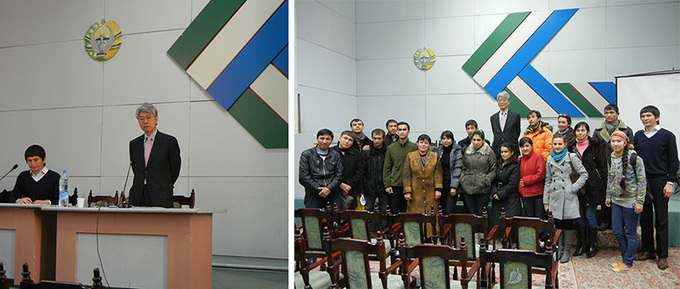
Lecture at Samarkand State Institute of Foreign Languages (November 24, 2012)
Japan's third crisis: the Great East Japan Earthquake
But the devastating earthquake on March 11, 2011, turned out to be a wake-up call for the Japanese. The global media came to Japan and witnessed how the Japanese people coped with the tragedy. The stories are many: they learned of a Japanese person, who rescued Chinese students in his care, sacrificing his own life in the process; they heard how evacuees, including a ten-year old child, lined up patiently to receive handouts of food and clothing, with hardly a trace of rioting, looting or panic. Fishermen in Hokkaido offered 228 of their own boats to their fellow fishermen in the devastated Sanriku area, so they could set out to sea in time for the spring fishing season. It was a gesture of thanks for the supports Hokkaido received 80 years earlier in a similar disaster.
A foreign journalist recounted how he took pity on a girl lining up with adults in the freezing cold for a meal and gave her a portion of his own food supply. To the journalist's surprise, the child took that food to the organizers of the soup kitchen and asked them to add it to the meal that was being distributed, and then returned to her place in the queue. How many years would it take, he asked himself, to see children in his own country, showing such a spirit of self-sacrifice?
Of course I wasn't relating these stories to boast about the Japanese people. What I wanted to say was that the Japanese, who were once falling into victim of the "rich country malady" and becoming entrapped in a sense of helplessness, now take back their sense of purpose, pride and confidence in their own abilities, and are ready to make a new start. I wanted Uzbekistan's younger generation to remember the breath of fresh air and enthusiasm that had accompanied the founding of their new nation in 1991, and to remind themselves of the wisdom they had nurtured through the long history of the Silk Road and take pride in that heritage. My lecture seemed to be well-received from the local audience and appeared to be the first time they had heard, what to them was a "revolutionary" message.
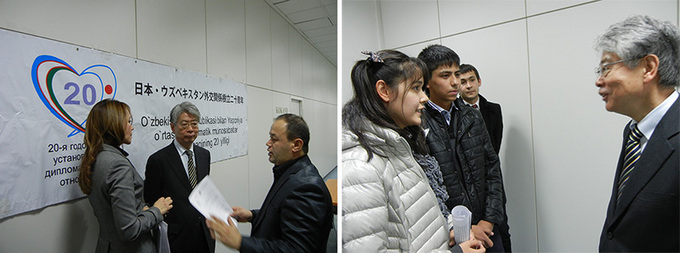
Lecture in Tashkent (November 26, 2012, co-organized by the Japan Foundation and Uzbekistan-Japan Center for Human Development)
Uzbekistan had changed significantly since my previous visit five years ago: I was amazed at a number of foreign-capital hotels that had gone up and I enjoyed a ride on their new bullet train from Tashkent to Samarkand. Standing in these towns, you become conscious of the enduring history of the Silk Road, and marvel at the remnants of ancient times that stretch back farther than Japan's past. I was reminded of an adage that went something like "Fools say that they learn by experience. I prefer to profit by others experience." This latest trip to Uzbekistan helped me remember that the Silk Road has left many valuable bequests to modern man. I was fortunate to be accompanied by the Japan Foundation's Masanori Takaguchi and he made it possible for me to achieve many satisfying encounters. What's more, I could meet up with many former exchange students who had been sponsored by the Japan-Uzbekistan Association, and I was also inspired by the energy of young female members of JICA's Japan Overseas Cooperation Volunteers. It made me proud to think that Japan was still active in these areas.
I would also like to thank Mr. Yoshihisa Kuroda, the Japanese Ambassador to Uzbekistan, Mr. Tsuyoshi Kurihara, the Frist Secretary of the Japanese Embassy, and Mr. Takashi Hayashi, Head of Representative at Tashkent Liaison Office, Marubeni Corporation and the Chairman of the Japanese residents' association in Uzbekistan, for all their support. And it was with great pleasure that I once again met Ms. Reiko Sugano of the Tashkent State Institute of Oriental Studies, who has devoted 20 years to teaching Japanese to the people of Uzbekistan. I am also very grateful for the generous time given to me by two young diplomats at the Ministry of Foreign Affairs of the Republic of Uzbekistan, Mr. Aziz Masutov, Head of Department of cooperation with Asia-Pacific countries and Mr. Siroj Azizov, Head of Division of Department of Cooperation with Asia and Pacific Region Countries, and also by Mr. Tursunali Kuziev, Minister of Cultural and Sports affairs.
I have noticed, though, with some regret, that changes seem to be taking place in the kind of students who show a wish to study in Japan. Unlike 15 years ago, when the Japan-Uzbekistan Association was first founded, the young Uzbeks who now come to Japan do not seem to be quite as committed as students in those early days. This is similar to Japan's present situation, where not all the young people have rediscovered the "determination" that inspired the Meiji Restoration and the recovery after the Second World War.
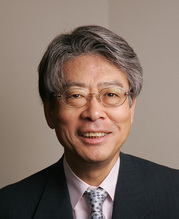 Nobuhiko Shima
Nobuhiko Shima
Nobuhiko Shima began his career as a journalist at the Mainichi Shimbun in 1967, specializing in economic affairs, and spent years as a correspondent in Washington, D.C. before leaving the company in 1987. He currently works as a free journalist as well as a TV commentator on TBS (Tokyo Broadcasting System)'s programs and others. In 1998, he founded the Japan-Uzbekistan Association and became its chairman, and has contributed to fostering close ties between the two nations.
In 2012, to commemorate the 20th anniversary of establishing diplomatic relations between Japan and Uzbekistan, Shima was asked to give lectures in Tashkent (November 26, 2012) and Samarkand (November 24, 2012) on the theme of "Japan's Third Crisis," in which he described the path taken by Japan after the Great East Japan Earthquake.
Keywords
- Politics
- Economics/Industry
- Social Securities/Social Welfare
- Natural Environment
- Philosophy/Religion
- History
- Japan
- Uzbekistan
- The Japan-Uzbekistan Associatio
- Great East Japan Earthquake
- Samarkand
- Samarkand State Institute of Foreign Languages
- Tashkent
- Uzbekistan-Japan Center for Human Development
- Meiji Restoration
- Sakamoto Ryoma
- Takasugi ShinsakuWorld War II
- GHQ
- 3.11
- Silk Road
- JICA
- Japan International Cooperation Agency
- Tashkent State Institute of Oriental Studies
- Bullet train
Back Issues
- 2024.11. 1 Placed together, we …
- 2024.5.24 The 50th Japan Found…
- 2024.5.24 The 50th Japan Found…
- 2024.2.19 Movie Theaters aroun…
- 2024.2.19 Movie Theaters aroun…
- 2023.4.24 The 49th Japan Found…
- 2022.10.24 Inner Diversity <2> …
- 2022.10. 5 Living Together with…
- 2022.6.13 The 48th Japan Found…
- 2022.6. 3 The 48th Japan Found…


